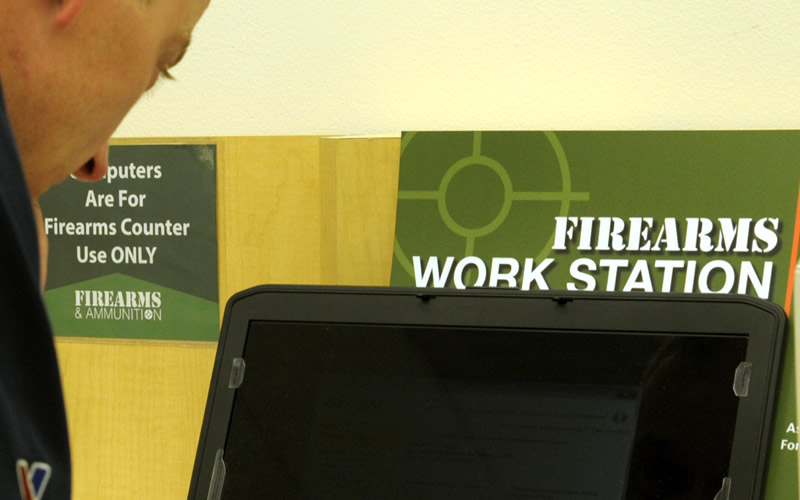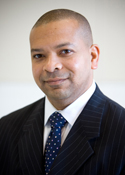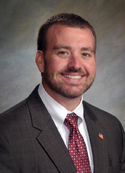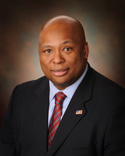
By Lindsay Street, Statehouse correspondent | Nearly three years after nine black parishioners — including a state senator — were gunned down in a Charleston church by a white supremacist, members of a Senate committee say they are poised to advance the body’s first gun reform related to the 2015 incident.
But it’s not the recent news of the Florida school shooting and subsequent student advocacy that brought the issue into the South Carolina committee this week. Rather, it’s the trudging of legislative process, according to Sen. Marlon Kimpson, the Charleston Democrat who is sponsor of the bipartisan bill.
“It took us this long to get it where it is,” Kimpson told Statehouse Report. In the Judiciary Committee, the bill drew discussion Tuesday but did not get a favorable vote to go to the Senate floor. But committee members on both sides of the aisle say the bill is likely to make it out of committee although it is not currently scheduled to be heard again and Kimpson says work remains. While the bill may make it to the floor, some say it won’t get much further this year — either due to it not being a priority or the fast-approaching end of the session.
Narrowly-tailored reform
Kimpson said his bill isn’t a hard stance on gun reform, and called it the “lightest but still meaningful.” He said it is the most “narrowly tailored” gun reform bill.

“If we can’t get this bill passed it will be impossible to do anything else on gun reform,” Kimpson said. “People are walking in schools and shooting the place up, and we still can’t get anything done.”
A gun-reform nonprofit that was founded after the Emanuel AME Church shooting, Arm-in-Arm, has been closely following the proposal (S. 516), also known as the Charleston loophole bill.
“This piece of legislation has resulted in the best conversations in changing the system,” founder Meghan Alexander told Statehouse Report this week. “That’s crucial. We’re not going to make any headway until we have these conversations over and over again … It’s all productive.”
South Carolina has leaned toward relaxing gun ownership and purchasing rules rather than tightening restrictions, with two recent exceptions. In 2013, after a threatened shooting at a Charleston private school, the state enacted a law that required the reporting of some mental health information to the federal database used for background checks of firearms buyers In 2015 after news stories about South Carolina having the nation’s highest rate of domestic violence, the state also enacted a law that prohibited gun possession by certain domestic abusers.
On closing the loophole
Kimpson’s bill does two things. First, it shortens the amount of time S.C. courts have to report gun-barring offenses to a database from 30 days to five days. Second, it lengthens the delay period for those seeking to buy a gun who aren’t either outright rejected or approved from three days to five days. It’s estimated to impact fewer than 7 percent of purchases. Also, the lengthened delay period would sunset after two years.
The delay period has been the most contentious part of the bill. It seeks to close the “Charleston loophole,” so named for the church gunman’s ability to purchase a gun — despite being charged with drug possession prior to his purchase of the gun that was used in the massacre. Authorities blamed the gunman’s purchase of the firearm on a clerical error.
The narrow focus of the bill has won it support but it has also drawn ire from both sides of the aisle.

“A lot of us feel like it doesn’t resolve any issue whatsoever,” said Sen. Stephen Goldfinch, a Georgetown Republican on the committee. He added he thought the bill would move out of committee to the Senate floor, however. A full meeting of the Judiciary is not scheduled at this time.
Sen. Gerald Malloy, D- Darlington, said his main issue with the bill was that it doesn’t do enough. Malloy chaired the Senate’s gun study committee and said S.C. Sen. Clementa Pinckney, Emanuel AME’s slain pastor, was a friend of his.
“It does nothing,” he said, calling it “feel-good legislation” and “masquerading it to the public as if we’re doing something.”
‘Art of the possible’
Kimpson said the additional two days for the waiting period reflected a compromise to bring the legislation to reality.
“Politics is the art of the possible and the best we could do is two additional days for two years,” he said. He added he hoped the additional two days over two years would help background checkers in the state “catch up” on checks.
“I don’t have a problem with it the way they changed it with that sunset clause,” Shealy said. She added that while it may not have stopped killer Dylann Roof’s rampage, it could catch others with the speedier time frame on reporting. “The biggest problem is mental illness or people with CDV (criminal domestic violence) who don’t get reported in time.”

Malloy said the court reporting aspect of the bill is the strongest and best concept, but said it is flawed due to some municipalities not having the same reporting system.
“I agree to move it forward but I think it has no chance of passing (the full Senate),” Malloy said. “It’s not a priority of the Senate and it’s not a (gun) committee bill.”
Goldfinch said he could see the possibility of it getting a positive vote in the Senate, despite Malloy’s skepticism. Shealy said she wasn’t sure if the Senate would have time to vote on it before the April 10 crossover deadline, after which a two-thirds majority is needed to pass the legislation.
The national conversation
While Kimpson said he doesn’t believe the Feb. 14 deadly high school shooting in Florida and the subsequent student protests spurred gun discussion in committee, Arm-in-Arm’s Alexander sees a connection.
“It’s impossible to ignore what is being said by the students right now and the educators and the parents,” Alexander said. “Parkland forced us all to look at it and say, ‘This could be my family.’
Arm-in-Arm is working to help organize the Charleston March for Our Lives protest Saturday. The group will also hold a discussion 5 p.m. to 7 p.m. March 28 at Daniel Island Library. The event is also organized by Moms Demand Action. Click here for more information.
There are 10 March for Our Lives events scheduled for Saturday around South Carolina. Click here to see where protests are scheduled.
Other bills related to guns
Here is a list of some other gun-related bills. There have been more than 50 so far this session, including some filed last week by S. 516’s Republican co-sponsor Greg Gregory.
- A bill banning bump stocks, raising the age to 21 to purchase a rifle, and the prohibition of large-capacity magazine ( 1118; similar to H. 3183 and H. 4975)
- Expanded/universal background checks (H. 3181)
- Background check delay period (S. 159)
- Making it unlawful to sell handguns to underage persons, with exemptions (S. 527)
- Prosecuting breaches such as falsification (S. 430)
- Unlawful threats with a firearm (S. 431)
There has also been a spate of school anti-violence bills considered following the Florida massacre, including one criminalizing school threats by Sen. Sandy Senn, R-Charleston. More: S. 431, which is similar to H. 5007.
- Have a comment? Send to: feedback@statehousereport.com.


